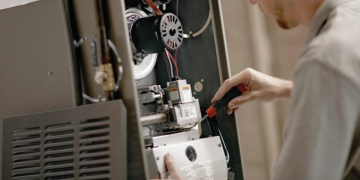Last Updated on May 23, 2024 by Hub Blogging
In the modern household, home appliances aren’t just luxuries; they are necessities. From the refrigerator that keeps your food fresh to the dryer that makes sure you have clean clothes, each appliance plays a crucial role in ensuring your home runs smoothly. However, like all heavily relied-upon technology, appliances have the tendency to wear out, break down, and require repair or replacement. Regular maintenance prolongs appliance lifespan, saving money and preventing major breakdowns. For a detailed guide on appliance upkeep, ensuring optimal performance, visit techycons.com for expert advice.
General Maintenance Tips
Before we dive into specific appliance care advice, let’s look at some general maintenance practices that apply to most home appliances:
Read the Manual: Always start by reading the product manual that accompanies each appliance. These booklets provide crucial information about care, usage and safety guidelines specific to the model you own.
Regular Cleaning: Regular cleaning is essential to maintain the efficiency of home appliances. Dust, dirt, and spilled substances can cause many appliances to function poorly or break down.
Inspect Cords and Connections: Check power cords and connections periodically for signs of wear or damage. Replace any frayed or damaged cords immediately to prevent hazards.
Keep Filters Clean: Many appliances have filters that are crucial to their operation. Keep these filters clean according to the manufacturer’s instructions. If a replacement is needed, you can buy quality appliances online. No need to buy a new device!
Seek Professional Help: Don’t hesitate to call in a professional for maintenance or repair work that goes beyond your skill set.
Refrigerators
Refrigerators are arguably the hardest working appliances in the home, constantly running to keep your food fresh. Tips for maintaining your refrigerator include:
Clean the Condenser Coils: At least twice a year, clean the condenser coils located at the back or beneath your fridge.
Monitor Temperature: Make sure your refrigerator and freezer are set to the appropriate temperatures—usually between 37 to 40 degrees Fahrenheit (3 to 4 degrees Celsius) for the refrigerator and 0 degrees Fahrenheit (-18 degrees Celsius) for the freezer.
Dishwashers
Dishwashers are exposed to food residue and detergent which can accumulate and affect performance. Maintain your dishwasher by:
Cleaning the Filter and Spray Arms: Regularly remove any food residues or debris from the dishwasher’s filter and spray arms.
Run Empty Loads with Vinegar: Once a month, run an empty load with a cup of vinegar placed on the top rack. This will help clean out any lingering residues and prevent odors.
Check and Clean Seals: Like refrigerators, check the door seals for any food residues that might prevent proper sealing.
Washing Machines
Washing machines deal with water, detergent, and a lot of movement, which can take a toll on their components. Useful tips include:
Check Hoses: Regularly inspect the hoses for bulges, leaks, or cracks. Replace the hose every 3-5 years or immediately if damage is noticed.
Use the Correct Amount of Detergent: Using too much detergent can cause extra wear and tear. Always follow the recommended amount for the size of the load.
Keep the Unit Level: Ensure your washing machine is on a flat surface. An unbalanced machine can vibrate strongly during the spin cycle, damaging the floor and the machine.
Dryers
Dryers are essential for families needing quick clothing turnarounds but can be fire hazards if not maintained. Here are some ways to keep your dryer in top shape:
Inspect Venting System: At least annually, check the venting system for blockages, lint build-up, or holes. Hiring a professional to clean the venting system every few years is also advisable.
Periodical Checks of the Drum Seal: The drum seal can become worn with use, which might cause irregularities and inefficiency.
Ovens and Stoves
Whether you are using a gas or electric stove, proper maintenance is crucial for safety and efficiency:
Keep it Clean: Regularly clean spills and ensure the burners and stove surface are free of debris to prevent fires.
Check the Burners: For gas stoves, ensure the burners are flame blue. A yellow flame indicates a problem.
Self-Clean Wisely: If using the self-cleaning function, follow the manufacturer’s guidance, usually two to four times a year depending on usage.
Conclusion
Maintaining your home appliances may seem like a daunting task, but with routine care and attention, you can greatly increase their lifespan and efficiency. This not only saves money on repairs and replacements but also ensures they remain in good working condition, providing convenience and safety in your daily life. Start by incorporating a few of these practices into your routine, and you’ll likely notice a difference in the performance and reliability of your appliances.



































































